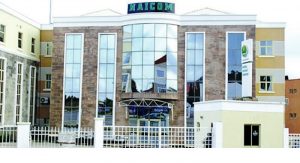
By Habibat Aliu
NIGERIA, Ghana, and the Gambia have rallied other countries on the need to remove bottlenecks slowing down the realisation of the African Continental Free Trade Area (AfCFTA) agenda.
Representatives of these countries stated this on Sunday during a press conference on the sideline of the 2nd General Assembly of the Digital Cooperation Organisation (DCO) held in Riyadh, Saudi Arabia.
AfCFTA is an agenda that promises broader and deeper economic integration and is expected to attract investment, boost trade, provide better jobs, reduce poverty, and increase shared prosperity in Africa.
Ghana’s Minister for Communications and Digitalisation, Mrs. Ursula Owusu-Ekuful, said it was time African countries come together to realize AfCFTA.
Owusu-Ekuful said digital technology would be crucial in achieving AfCFTA, stressing that a robust infrastructure linked together can help Africa greatly.
While adding that countries must harmonize policies to be able to push the AfCFTA agenda to a reasonable conclusion, the Ghanaian minister said it was incumbent on member countries in the region to work together and invest in digital infrastructure.
“It is not rocket science, but we must conclude on what we have started. We must harmonise customs rules, and our payments systems through the Central banks and Afrexim Bank must centralise through technology to ensure seamless business transactions among African countries. We must collaborate and understand our peculiarities,” she stated.
His counterpart from Gambia, Ousman Bah, said the political will of leaders of African countries would be central to realising AfCFTA.
“All heads of state in Africa must understand the need for countries to come together and achieve this. There should be a unified, especially in the payment system. For example, see what is happening in the European Union, we can see that with unity, they have been able to achieve so much. Africa must come together to realise AfCFTA,” Bah said.
On his part, Nigeria’s Minister of Communications and Digital Economy, Prof. Isa Pantami, said AfCFTA is the largest agreement in the world because it involves 54 countries and about 1.4 billion people, “so, it is important Africa understands the potential of realising this agreement.”
Pantami said with AfCFTA, economies can move from being consumer nations to becoming manufacturing or producing countries.
According to him, at a time when the whole world is going digital, it will be an opportunity for economies in the region to become a knowledge economy.
“AfCFTA would require that we harness our talent in Africa and set a target of what we want to achieve almost on a decade basis. This will help in getting it on track,” he stated.
The Nigerian minister, who used the occasion to answer questions on some of the developments in the country’s digital economy sector, said African countries must work together on AfCFTA so as not to be left behind.
On his efforts in Nigeria, Pantami said in 2019, changing the nomenclature of the Ministry of Communications Technology to the Ministry of Communications and Digital Economy was the ladder that helped the country record some developments.
“One of the things we did is the digital ID. It moved from 39 million to over 95 million within two years. The ICT sector also contributed significantly to the country’s GDP. In the first quarter of 2020, it contributed 14.07 percent; second quarter of 2021, it added 17.90 percent and in the same period of 2022, it contributed 18.44 percent.
“We increased revenue generation for the government through ICT from N51 billion quarterly to $408 billion quarterly, which is an increase of 594 percent. Mobile and broadband subscriptions also increased significantly,” he stated.








